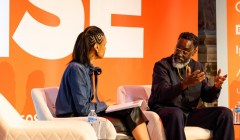
Create for consumers, don’t market at them
Speaking at the Creative Equals Rise conference, Ije Nwokorie, Chief Brand Officer at Dr Martens urged marketers to adopt a product-led mindset

UMG and TikTok battle as audiences continually change the ways they interact with music

The recent decision by music’s biggest conglomerate, Universal Music Group (UMG) to not renew their licensing contract with social media giant TikTok has sent shockwaves rippling outwards across all those in the social landscape.
In a statement shared by the company, UMG expressed concerns surrounding the fair remuneration of their artists and implied intimidation from the platform, raising important questions about the relationships between social media platforms and record labels. This move by UMG indicates a fascinating new chapter in the intersection of music and digital platforms.
TikTok’s stratospheric ascent to prominence has been impossible to miss, and thanks to their unique approach to content creation - particularly their heavy reliance on music - they have been able to cause a shift in the trending content formats, applying pressure to other platforms to pivot their strategy to focus on video first. This approach has undoubtedly enabled artists to amplify the reach of their music through trending audio clips that are used in a myriad of content pieces; from GRWM’s to choreography pieces, skincare hauls to days in the lives, the integration of music in TikTok content has been seemingly endless.
This phenomenon has not only transformed the way that users consume and interact with music, but has also subsequently impacted the structure and production of popular music. The conventional three-and-a-half minute song format has given way to an average duration of around the two minute mark, aligning with TikTok’s preference for concise and snappy content. Again, enabling artists to bolster the reach of their new releases and keep the tracks in consumers’ minds.
UMG’s decision and public statement surrounding the matter have implications that will extend beyond just contractual matters. The potential fallout could see the creative processes of UMG’s artists affected once more, as they create music that is still geared for social-friendly, yet enables them to not limit their creativity to the length of a social media video post. Years before this, Adele spoke out on not making music for TikTok in an interview with Zane Lowe, and following the news of UMG’s decision, Yungblud shared his thoughts on his Instagram story. In the story frames, he spoke about the nature of platforms coming and going and how an artist’s music should be “beholden to tech companies”, as “you cut a bit of your soul out and put it into art” and that lasting forever. Further salt in the proverbial wound for TikTok is that a number of UMG’s globally known artists are in the process of creating, or are about to release, new albums, including Taylor Swift, Ariana Grande and Lady Gaga.
In the initial wake of UMG’s departure from TikTok’s music library, it is likely that we may see a decline in TikTok’s influence within the music industry.
Jack Bradley, Social Community Manager, recipe
Furthermore, the removal of TikTok’s influence on UMG and wider music trends may now pose an opportunity for artists to explore longer and more complex song structures now that there is not that external pressure. This could also see the preferred social media platform for music promotion shift to competitors such as Instagram, which may be more inclined to better accommodate the requests of UMG, come the time for them to renew their licensing and partnership agreements.
In the initial wake of UMG’s departure from TikTok’s music library, it is likely that we may see a decline in TikTok’s influence within the music industry. We may even see a number of artists and other labels put less focus on the platform for a short period of time.
When we look longer-term, it is harder to predict the outcome. Given that they are known for their adaptability and responsiveness to trends, TikTok may regroup to adjust its strategy and ensure their relationships with other record labels are as strong as possible. This could even provide an opportunity for labels like Sony BMG to become even closer with TikTok, perhaps even with their artists being preferred over others and more heavily promoted on the platform.
Alternatively, this debacle may act as a learning curve for TikTok, who may then go on to adjust their terms for artists and create better environments for them to create music without the pressure of it being a social-friendly piece. If navigated properly, TikTok may well come back from this stronger than ever and lead the charge on artist partnerships with social platforms. The difficulty with predicting in the social media space is that it is ever-evolving and at such a speed that things can happen so fast and unexpectedly. We may even be at a turning point whereby the music industry, as a whole, re-evaluates its relationship with social media and whether we see a step away from the symbiotic nature it currently has with each other.
What is certain is that it will be an interesting time to watch the ripple effect of this situation and the future of relationships between both the music industry and social media platforms and music promotion.
Jack started in the fashion departments of magazines Attitude, LOVE and Gay Times. He then went to work in the PR team for Liberty and from there, working with brands and agencies across multiple categories with clients such as Armani Beauty, Clarks and Church & Dwight. He has had a stint as an influencer agent and has worked at several influencer marketing agencies. He has been at Recipe for almost a year and looks after the social accounts of Audible, Deli Kitchen and Channel 5.
Looks like you need to create a Creativebrief account to perform this action.
Create account Sign inLooks like you need to create a Creativebrief account to perform this action.
Create account Sign in